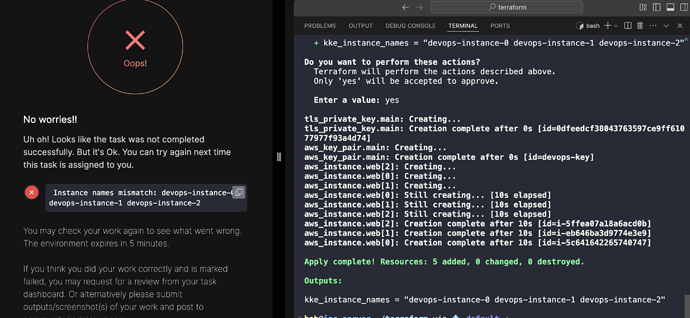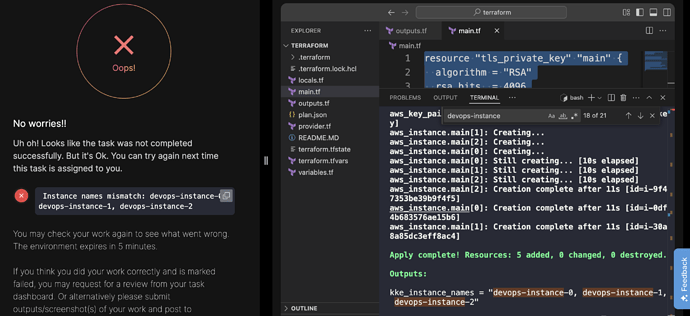I wrote the correct terraform script for the requirement; and instances also created successfully; While printing instances name to output: task getting failed.
I tried with multiple output option:
output “kke_instance_names” {
value = [for instance in aws_instance.kke : instance.tags[“Name”]]
}
output “kke_instance_names” {
value = join(“\n”, [for instance in aws_instance.kke : instance.tags[“Name”]])
}
output “kke_instance_names” {
value = join(" ", [for instance in aws_instance.kke : instance.tags[“Name”]])
}
output “kke_instance_names” {
value = join(“,”, [for instance in aws_instance.kke : instance.tags[“Name”]])
}
Still task is getting failed…
Hi @nirdeshkumar02
You may need to wait until the instances are in running state.
If it still fails. You need to share the files.
@Santosh_KodeKloud tried the same but still failing. In which format we need to print instances name in output block is missing in the task.
Plan generated by above code –
data.aws_ami.amazon_linux_2: Reading...
data.aws_ami.amazon_linux_2: Read complete after 1s [id=ami-04681a1dbd79675a5]
Terraform used the selected providers to generate the
following execution plan. Resource actions are indicated
with the following symbols:
+ create
Terraform will perform the following actions:
# aws_instance.main[0] will be created
+ resource "aws_instance" "main" {
+ ami = "ami-04681a1dbd79675a5"
+ arn = (known after apply)
+ associate_public_ip_address = (known after apply)
+ availability_zone = (known after apply)
+ cpu_core_count = (known after apply)
+ cpu_threads_per_core = (known after apply)
+ disable_api_stop = (known after apply)
+ disable_api_termination = (known after apply)
+ ebs_optimized = (known after apply)
+ enable_primary_ipv6 = (known after apply)
+ get_password_data = false
+ host_id = (known after apply)
+ host_resource_group_arn = (known after apply)
+ iam_instance_profile = (known after apply)
+ id = (known after apply)
+ instance_initiated_shutdown_behavior = (known after apply)
+ instance_lifecycle = (known after apply)
+ instance_state = (known after apply)
+ instance_type = "t2.micro"
+ ipv6_address_count = (known after apply)
+ ipv6_addresses = (known after apply)
+ key_name = (known after apply)
+ monitoring = (known after apply)
+ outpost_arn = (known after apply)
+ password_data = (known after apply)
+ placement_group = (known after apply)
+ placement_partition_number = (known after apply)
+ primary_network_interface_id = (known after apply)
+ private_dns = (known after apply)
+ private_ip = (known after apply)
+ public_dns = (known after apply)
+ public_ip = (known after apply)
+ secondary_private_ips = (known after apply)
+ security_groups = (known after apply)
+ source_dest_check = true
+ spot_instance_request_id = (known after apply)
+ subnet_id = (known after apply)
+ tags = {
+ "Name" = "devops-instance-0"
}
+ tags_all = {
+ "Name" = "devops-instance-0"
}
+ tenancy = (known after apply)
+ user_data = (known after apply)
+ user_data_base64 = (known after apply)
+ user_data_replace_on_change = false
+ vpc_security_group_ids = (known after apply)
+ capacity_reservation_specification (known after apply)
+ cpu_options (known after apply)
+ ebs_block_device (known after apply)
+ enclave_options (known after apply)
+ ephemeral_block_device (known after apply)
+ instance_market_options (known after apply)
+ maintenance_options (known after apply)
+ metadata_options (known after apply)
+ network_interface (known after apply)
+ private_dns_name_options (known after apply)
+ root_block_device (known after apply)
}
# aws_instance.main[1] will be created
+ resource "aws_instance" "main" {
+ ami = "ami-04681a1dbd79675a5"
+ arn = (known after apply)
+ associate_public_ip_address = (known after apply)
+ availability_zone = (known after apply)
+ cpu_core_count = (known after apply)
+ cpu_threads_per_core = (known after apply)
+ disable_api_stop = (known after apply)
+ disable_api_termination = (known after apply)
+ ebs_optimized = (known after apply)
+ enable_primary_ipv6 = (known after apply)
+ get_password_data = false
+ host_id = (known after apply)
+ host_resource_group_arn = (known after apply)
+ iam_instance_profile = (known after apply)
+ id = (known after apply)
+ instance_initiated_shutdown_behavior = (known after apply)
+ instance_lifecycle = (known after apply)
+ instance_state = (known after apply)
+ instance_type = "t2.micro"
+ ipv6_address_count = (known after apply)
+ ipv6_addresses = (known after apply)
+ key_name = (known after apply)
+ monitoring = (known after apply)
+ outpost_arn = (known after apply)
+ password_data = (known after apply)
+ placement_group = (known after apply)
+ placement_partition_number = (known after apply)
+ primary_network_interface_id = (known after apply)
+ private_dns = (known after apply)
+ private_ip = (known after apply)
+ public_dns = (known after apply)
+ public_ip = (known after apply)
+ secondary_private_ips = (known after apply)
+ security_groups = (known after apply)
+ source_dest_check = true
+ spot_instance_request_id = (known after apply)
+ subnet_id = (known after apply)
+ tags = {
+ "Name" = "devops-instance-1"
}
+ tags_all = {
+ "Name" = "devops-instance-1"
}
+ tenancy = (known after apply)
+ user_data = (known after apply)
+ user_data_base64 = (known after apply)
+ user_data_replace_on_change = false
+ vpc_security_group_ids = (known after apply)
+ capacity_reservation_specification (known after apply)
+ cpu_options (known after apply)
+ ebs_block_device (known after apply)
+ enclave_options (known after apply)
+ ephemeral_block_device (known after apply)
+ instance_market_options (known after apply)
+ maintenance_options (known after apply)
+ metadata_options (known after apply)
+ network_interface (known after apply)
+ private_dns_name_options (known after apply)
+ root_block_device (known after apply)
}
# aws_instance.main[2] will be created
+ resource "aws_instance" "main" {
+ ami = "ami-04681a1dbd79675a5"
+ arn = (known after apply)
+ associate_public_ip_address = (known after apply)
+ availability_zone = (known after apply)
+ cpu_core_count = (known after apply)
+ cpu_threads_per_core = (known after apply)
+ disable_api_stop = (known after apply)
+ disable_api_termination = (known after apply)
+ ebs_optimized = (known after apply)
+ enable_primary_ipv6 = (known after apply)
+ get_password_data = false
+ host_id = (known after apply)
+ host_resource_group_arn = (known after apply)
+ iam_instance_profile = (known after apply)
+ id = (known after apply)
+ instance_initiated_shutdown_behavior = (known after apply)
+ instance_lifecycle = (known after apply)
+ instance_state = (known after apply)
+ instance_type = "t2.micro"
+ ipv6_address_count = (known after apply)
+ ipv6_addresses = (known after apply)
+ key_name = (known after apply)
+ monitoring = (known after apply)
+ outpost_arn = (known after apply)
+ password_data = (known after apply)
+ placement_group = (known after apply)
+ placement_partition_number = (known after apply)
+ primary_network_interface_id = (known after apply)
+ private_dns = (known after apply)
+ private_ip = (known after apply)
+ public_dns = (known after apply)
+ public_ip = (known after apply)
+ secondary_private_ips = (known after apply)
+ security_groups = (known after apply)
+ source_dest_check = true
+ spot_instance_request_id = (known after apply)
+ subnet_id = (known after apply)
+ tags = {
+ "Name" = "devops-instance-2"
}
+ tags_all = {
+ "Name" = "devops-instance-2"
}
+ tenancy = (known after apply)
+ user_data = (known after apply)
+ user_data_base64 = (known after apply)
+ user_data_replace_on_change = false
+ vpc_security_group_ids = (known after apply)
+ capacity_reservation_specification (known after apply)
+ cpu_options (known after apply)
+ ebs_block_device (known after apply)
+ enclave_options (known after apply)
+ ephemeral_block_device (known after apply)
+ instance_market_options (known after apply)
+ maintenance_options (known after apply)
+ metadata_options (known after apply)
+ network_interface (known after apply)
+ private_dns_name_options (known after apply)
+ root_block_device (known after apply)
}
# aws_key_pair.main will be created
+ resource "aws_key_pair" "main" {
+ arn = (known after apply)
+ fingerprint = (known after apply)
+ id = (known after apply)
+ key_name = "devops-key"
+ key_name_prefix = (known after apply)
+ key_pair_id = (known after apply)
+ key_type = (known after apply)
+ public_key = (known after apply)
+ tags_all = (known after apply)
}
# tls_private_key.main will be created
+ resource "tls_private_key" "main" {
+ algorithm = "RSA"
+ ecdsa_curve = "P224"
+ id = (known after apply)
+ private_key_openssh = (sensitive value)
+ private_key_pem = (sensitive value)
+ private_key_pem_pkcs8 = (sensitive value)
+ public_key_fingerprint_md5 = (known after apply)
+ public_key_fingerprint_sha256 = (known after apply)
+ public_key_openssh = (known after apply)
+ public_key_pem = (known after apply)
+ rsa_bits = 4096
}
Plan: 5 to add, 0 to change, 0 to destroy.
Changes to Outputs:
+ kke_instance_names = "devops-instance-0, devops-instance-1, devops-instance-2"
----- main.tf file ------
resource "tls_private_key" "main" {
algorithm = "RSA"
rsa_bits = 4096
}
resource "aws_key_pair" "main" {
key_name = var.KKE_KEY_NAME
public_key = tls_private_key.main.public_key_openssh
}
resource "aws_instance" "main" {
count = var.KKE_INSTANCE_COUNT
ami = local.AMI_ID
instance_type = var.KKE_INSTANCE_TYPE
key_name = aws_key_pair.main.id
tags = {
Name = "${var.KKE_INSTANCE_PREFIX}-${count.index}"
}
}
------ variables.tf --------
variable "KKE_INSTANCE_COUNT" {
type = number
}
variable "KKE_INSTANCE_TYPE" {
type = string
}
variable "KKE_KEY_NAME" {
type = string
}
variable "KKE_INSTANCE_PREFIX" {
type = string
}
------ Terraform.tfvars --------
KKE_INSTANCE_COUNT = 3
KKE_INSTANCE_TYPE = "t2.micro"
KKE_KEY_NAME = "devops-key"
KKE_INSTANCE_PREFIX = "devops-instance"
------ locals.tf -------
data "aws_ami" "amazon_linux_2" {
most_recent = true
owners = ["amazon"]
filter {
name = "name"
values = ["amzn2-ami-hvm-*-x86_64-gp2"]
}
filter {
name = "virtualization-type"
values = ["hvm"]
}
}
locals {
AMI_ID = data.aws_ami.amazon_linux_2.id
}
--------- outputs.tf -----------
**Tried with multiple options: shared below **
output “kke_instance_names” {
value = [for instance in aws_instance.main : instance.tags[“Name”]]
}
output “kke_instance_names” {
value = join(“\n”, [for instance in aws_instance.main : instance.tags[“Name”]])
}
output “kke_instance_names” {
value = join(" ", [for instance in aws_instance.main : instance.tags[“Name”]])
}
output “kke_instance_names” {
value = join(“,”, [for instance in aws_instance.main : instance.tags[“Name”]])
}
task getting failed each times after printing instance name in output with different way shared above


